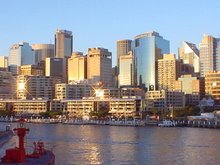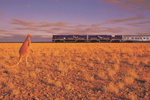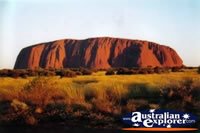I did a variety of reading to get ready for Australia. Friend, Ann Look, loaned me her book,
In a Sunburned Country, by Bill Bryson. Bryson is a humorist and travel writer – I had previously read his book on hiking the Appalachian Trail,
A Walk in the Woods, but didn’t know he had “done” Australia.

A recurring theme in Bryson’s Australia book is the many unpleasant ways you can die there. First, there’s the whole interior of the country – extreme heat, lack of water. Bryson says,
“Australia is the driest, flattest, hottest, most desiccated, infertile, and climatically aggressive of all the inhabited continents. Only Antarctica is more hostile to life.”Bryson also worries about Australian animal life: the world's top ten poisonous snakes are Australian. Additonally: crocodiles, poisonous spiders, and various venomous sea creatures. We'll be careful.
Bryson rode the Indian Pacific train. He loved it. "It was like being given a preview of what it will be like to be in your eighties. All those things eighty-year-olds appear to enjoy -- staring vacantly out windows, dozing in a chair, boring the pants off anyone foolish enough to sit beside them -- took on a special treasured meaning for me. This was the life!" Can't wait -- for the train, not being eighty.
Before my 1991 trip my sister, Verla, sent me a
National Geographic with an article about the “camel lady.”
Robyn Davidson left a comfortable life in Brisbane in the 1970s to spend two years in Alice Springs learning about camel care & handling. Then she took a string of four camels 1700 miles across the desert to the west coast. Her book,
Tracks, tells her story. I re-read that book and was struck by the emotional aspects of her experience. She writes a lot about what it’s like to abandon a modern lifestyle for a primitive, Aborigine-like type of existence
. Physically, it was very tough, too, as you might imagine, especially when marauding bands of wild camels threatened her camels.

For more background reading I went to the Albuquerque library and Amazon listings for "Australian fiction." Checked a few out of the library. The Secret River, by Kate Grenville was a good piece of historical fiction, an award-winning book about a British convict sentenced to death, for theft, whose term was commuted to exile in Australia in the early 1800s. His wife was sent with him, in essence, to be his parole officer. They end up settling along a little-known river and the book deals mostly with raising a family there and dealing with elements, other settlers, and the Aborigines in the area.
Bryson notes that Australians he met didn't want to talk about the Aborigine "problem." The situation twenty years earlier is addressed in Davidson's book. I also read the Rabbit-Proof Fence and Susie and I watched the movie which is about three half-breed girls taken from their families and sent to a government boarding school. They escape and walk 1200 miles to get home.
I've been reading Aussie newspapers and there are frequent stories about current Aborigine issues and government programs. As we know, it's not easy finding the right way to merge immigrant and indigenous peoples and cultures.
Incidentally, a friend advised us that Australia still requires a criminal record in order to get into the country, so when Immigration asks, say yes.
Last spring, when we were in Fredericksburg, TX, I picked up The Old Patagonian Express, by Paul Theroux. He left his home in Boston, then by catching successive trains, where possible, traveled to southern Argentina -- Patagonia. He's written other books based on his train travel. These are not guide books. He writes about people he meets, what he eats and drinks, troubles encountered trying to get from one point to another, books he reads while traveling, etc. He's a bit of a curmudgeon, but in an entertaining way.
Theroux also writes about travel-writing. When he started thinking about writing about his travels, he had found that most travel writing was a bore -- just about sight-seeing. He had found that "half of travel was delay or nuisance." So, he wrote about his travel experiences. One quote: "When something human is recorded, good travel writing happens." In my abbreviated, bloggy way, I'll try to remember that.
People have remarked about our (Susie's and my) willingness to write, expose ourselves, about troubles we have encountered in our motor home travels. Well, those misadventures were some of the most interesting things that happened so, given they weren't tragedies, it seemed appropriate to tell it like it was. We weren't consciously following Theroux, but still consistent with his approach, I like to think.
At any rate, I'm taking a couple of books on this trips that Theroux took on his. If I get around to reading them, I'll let you know about it.
Four days until departure!
Cheers,
Rob







No comments:
Post a Comment